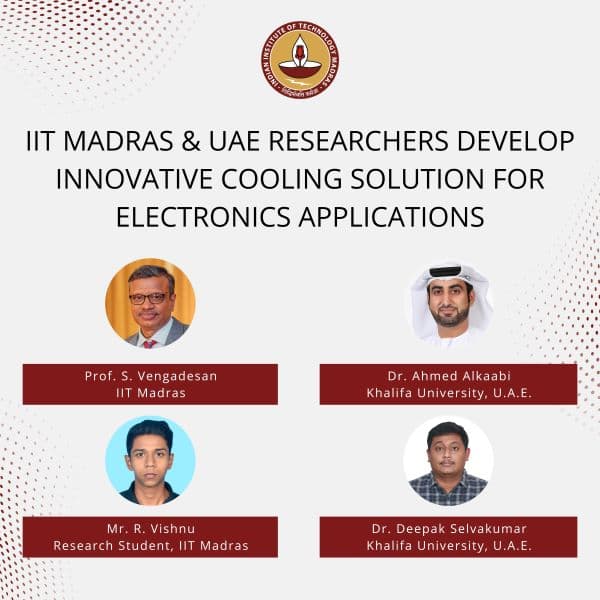IIT Madras and UAE researchers develop innovative cooling solution

IIT Madras and Khalifa University (U.A.E.) researchers have made significant strides in advancing heat management for miniature electronic devices, particularly for space applications.
This breakthrough of researchers at IIT Madras and Khalifa University in mini-channel heat exchangers has been published in the reputed peer-reviewed journal Applied Thermal Engineering (https://doi.org/10.1016/j.applthermaleng.2023.121064).


Second space age
India’s second Space Age has been driven by impressive technological innovations and the miniaturization of electronic components, enabling advanced functionalities, exemplified by the ongoing Chandrayaan-3 mission, say sources from IIT Madras.
However, the extensive use of miniaturized electronic components, both in space missions and consumer electronics, leads to significant heat generation, say sources from IIT Madras.

High-performance computing processors can generate up to 200-250 W or more of power, resulting in heat loads of up to 1 kW, necessitating efficient heat management. Liquid-cooling systems, especially micro/mini-channel heat sinks, are considered best suited for dissipating heat in such systems.
The research conducted by the IIT Madras team aims to disrupt the smooth flow inside the mini-channels through the use of plate electrodes.
Significance
Elaborating about the significance of this research, Prof. S. Vengadesan, Department of Applied Mechanics and Biomedical Engineering, IIT Madras, said, “The new design developed by this research team uses thin plate electrodes that introduce swirling flows inside mini-channel fluids, which result in the formation of vortices at the boundaries, which in turn facilitates better heat transfer.”

Design
To validate the design, the researchers employed computational methods that simulate fluid flows in three dimensions.
Through these simulations, they observed how the chaotic swirling flows effectively disrupted the smooth flow at the walls of the channels, and thereby enhanced heat transfer, say sources from IIT Madras.
The electrodes induce vortices at the boundary layer due to the Onsager-Wien effect, and disrupts the smooth flow, say sources from IIT Madras.


The study’s applications in electronic thermal management, particularly in space technology, are vast. Additionally, the electrically driven flow vortices generated by this design eliminate the need for additional geometrical modifications.
With no moving parts, this design operates without vibration and requires no maintenance. Furthermore, its electrically operated nature ensures intelligent control and quick response, say sources from IIT Madras.

The Institute offers undergraduate and postgraduate programmes leading to B.Tech., M.Sc., M.B.A., M.Tech., M.S., and Ph.D., degrees in a variety of specialisations.
IITM is a residential institute with more than 600 faculty and 9,500 students. Students from 18 countries are enrolled here. IITM fosters an active entrepreneurial culture with strong curricular support and through the IITM Incubation Cell.
Recognized as an Institution of Eminence (IoE) in 2019, IITM has been ranked No.1 in the ‘Overall’ Category for the fourth consecutive year in India Ranking 2022 released by National Institutional Ranking Framework, Ministry of Education, Govt. of India.
The Institute has also been ranked No.1 in the ‘Engineering Institutions’ category in the same Rankings for seven consecutive years – from 2016 to 2022.
It was also adjudged as the ‘Top innovative Institution’ in the country in Atal Ranking of Institutions on Innovation Achievements (ARIIA) in 2019, 2020 and 2021.
ARIIA Ranking was launched by the Innovation Cell of Ministry of Education.
S Vishnu Sharmaa now works with collegechalo.com in the news team. His work involves writing articles related to the education sector in India with a keen focus on higher education issues. Journalism has always been a passion for him. He has more than 10 years of enriching experience with various media organizations like Eenadu, Webdunia, News Today, Infodea. He also has a strong interest in writing about defence and railway related issues.






